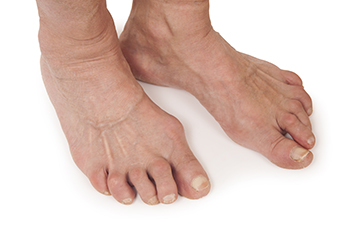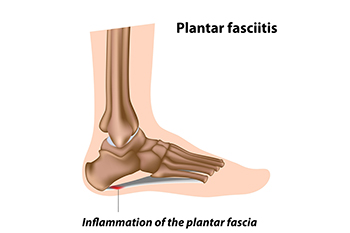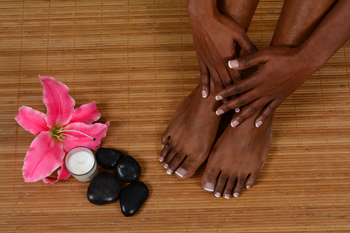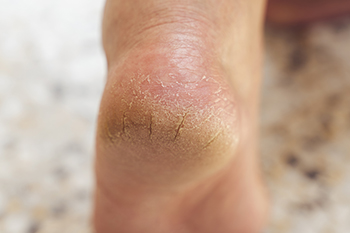December 2023
Telltale Signs of Rheumatoid Arthritis in the Feet

Rheumatoid arthritis, or RA, is an autoimmune disorder that primarily affects the joints, and the feet are often one of the first areas to display symptoms. Understanding the signs of RA in the feet is essential for early diagnosis and effective management of this chronic condition. One common symptom of RA in the feet is joint pain and stiffness. Affected individuals may experience discomfort in the joints of the toes, ankles, or the midfoot. This pain is typically more pronounced in the morning and may improve with movement. Swelling is another noticeable sign. RA can cause inflammation in the synovium, a lining that surrounds joints. When this occurs in the feet, it leads to visible swelling, making it harder to wear shoes comfortably. Deformities, such as bunions, claw toes, or hammertoes, can also develop due to the erosion of joint tissues. These ailments are often accompanied by limited mobility in the affected toes. If you notice these symptoms in your feet, it is suggested that you consult a podiatrist who can effectively diagnose RA, and help you to manage this condition.
Because RA affects more than just your joints, including the joints in your feet and ankles, it is important to seek early diagnosis from your podiatrist if you feel like the pain in your feet might be caused by RA. For more information, contact one of our podiatrists of Central Ohio Comprehensive Foot Care. Our doctors will assist you with all of your podiatric concerns.
What Is Rheumatoid Arthritis?
Rheumatoid Arthritis (RA) is an autoimmune disorder in which the body’s own immune system attacks the membranes surrounding the joints. Inflammation of the lining and eventually the destruction of the joint’s cartilage and bone occur, causing severe pain and immobility.
Rheumatoid Arthritis of the Feet
Although RA usually attacks multiple bones and joints throughout the entire body, almost 90 percent of cases result in pain in the foot or ankle area.
Symptoms
- Swelling and pain in the feet
- Stiffness in the feet
- Pain on the ball or sole of feet
- Joint shift and deformation
Diagnosis
Quick diagnosis of RA in the feet is important so that the podiatrist can treat the area effectively. Your doctor will ask you about your medical history, occupation, and lifestyle to determine the origin of the condition. Rheumatoid Factor tests help to determine if someone is affected by the disease.
If you have any questions please feel free to contact one of our offices located in Delaware and Westerville, OH . We offer the newest diagnostic and treatment technologies for all your foot and ankle needs.
Definition and Risk Factors Explored for Plantar Fasciitis

Plantar fasciitis, a prevalent foot condition, unfolds as inflammation of the plantar fascia, which is the thick band of tissue connecting the heel bone to the toes. This inflammation results in stabbing pain, typically most pronounced during the first steps in the morning or after periods of inactivity. The plantar fascia plays an important role in supporting the foot's arch and absorbing shock during walking. Several risk factors contribute to the development of plantar fasciitis. Prolonged periods of standing or walking on hard surfaces can strain the plantar fascia, increasing susceptibility. Individuals with high arches or flat feet may experience altered weight distribution, intensifying stress on the foot's support structure. Additionally, having tight calf muscles and Achilles tendons may also heighten the risk, limiting ankle flexibility. Understanding the definition and associated risk factors of plantar fasciitis is vital for proactive management. If you have heel pain, it is strongly suggested that you seek the counsel of a podiatrist who can offer treatment options for this painful condition.
Plantar fasciitis is a common foot condition that is often caused by a strain injury. If you are experiencing heel pain or symptoms of plantar fasciitis, contact one of our podiatrists from Central Ohio Comprehensive Foot Care. Our doctors can provide the care you need to keep you pain-free and on your feet.
What Is Plantar Fasciitis?
Plantar fasciitis is one of the most common causes of heel pain. The plantar fascia is a ligament that connects your heel to the front of your foot. When this ligament becomes inflamed, plantar fasciitis is the result. If you have plantar fasciitis you will have a stabbing pain that usually occurs with your first steps in the morning. As the day progresses and you walk around more, this pain will start to disappear, but it will return after long periods of standing or sitting.
What Causes Plantar Fasciitis?
- Excessive running
- Having high arches in your feet
- Other foot issues such as flat feet
- Pregnancy (due to the sudden weight gain)
- Being on your feet very often
There are some risk factors that may make you more likely to develop plantar fasciitis compared to others. The condition most commonly affects adults between the ages of 40 and 60. It also tends to affect people who are obese because the extra pounds result in extra stress being placed on the plantar fascia.
Prevention
- Take good care of your feet – Wear shoes that have good arch support and heel cushioning.
- Maintain a healthy weight
- If you are a runner, alternate running with other sports that won’t cause heel pain
There are a variety of treatment options available for plantar fasciitis along with the pain that accompanies it. Additionally, physical therapy is a very important component in the treatment process. It is important that you meet with your podiatrist to determine which treatment option is best for you.
If you have any questions, please feel free to contact one of our offices located in Delaware and Westerville, OH . We offer the newest diagnostic and treatment technologies for all your foot care needs.
Footcare and Overall Well Being

Proper foot care is essential for maintaining mobility and overall quality of life and becomes increasingly important with age. Foot issues can hinder everyday activities, such as walking, shopping, and exercising, leading to impaired mobility and a decreased quality of life. Pain or altered walking due to foot problems heightens the risk of falls, potentially impacting mental well being, social interaction, and increasing the likelihood of depression. In the workplace, foot pain can reduce productivity, affecting self esteem and effectiveness. Moreover, good foot health is vital for maintaining the ability to exercise, which in turn affects general health, weight management, and the risk of diabetes and heart disease. Surgery for foot issues may result in lasting mobility challenges, altering lifestyle and well-being. For those with diabetes, foot care is even more critical as high blood sugar can lead to circulation issues and nerve damage, increasing the risk of hard to treat infections. As part of your journey to improve your overall health and well being, it is suggested that you make an appointment with a podiatrist to have your feet examined, obtain any necessary treatment, and learn about effective foot care.
Everyday foot care is very important to prevent infection and other foot ailments. If you need your feet checked, contact one of our podiatrists from Central Ohio Comprehensive Foot Care. Our doctors can provide the care you need to keep you pain-free and on your feet.
Everyday Foot Care
Often, people take care of their bodies, face and hair more so than they do for their feet. But the feet are a very important aspect of our bodies, and one that we should pay more attention to. Without our feet, we would not be able to perform most daily tasks.
It is best to check your feet regularly to make sure there are no new bruises or cuts that you may not have noticed before. For dry feet, moisturizer can easily be a remedy and can be applied as often as necessary to the affected areas. Wearing shoes that fit well can also help you maintain good foot health, as well as making it easier to walk and do daily activities without the stress or pain of ill-fitting shoes, high heels, or even flip flops. Wearing clean socks with closed shoes is important to ensure that sweat and bacteria do not accumulate within the shoe. Clean socks help to prevent Athlete’s foot, fungi problems, bad odors, and can absorb sweat.
If you have any questions please feel free to contact one of our offices located in Delaware and Westerville, OH . We offer the newest diagnostic and treatment technologies for all your foot and ankle needs.
Exploring the Causes of Cracked Heels

Cracked heels, a common foot ailment, result from a combination of environmental, lifestyle, and health factors. Insufficient moisture is a primary culprit, as dry skin lacks the flexibility to withstand the pressures of daily activities, leading to heel fissures. Prolonged standing or walking on hard surfaces can contribute to the development of cracks, especially when combined with ill-fitting shoes that fail to provide adequate support. Skin conditions such as eczema or psoriasis may exacerbate heel dryness, making them more susceptible to cracking. Unhealthy lifestyle habits, including poor nutrition and dehydration, can impact skin health, diminishing its ability to retain moisture. Obesity or excess body weight increases pressure on the heels, further predisposing them to crack. Additionally, age-related factors such as reduced oil production and diminished skin elasticity make older individuals more prone to cracked heels. If you have developed cracked heels, it is strongly suggested that you visit a podiatrist who can provide you with treatment options, which may include prescribed medication.
Cracked heels are unsightly and can cause further damage to your shoes and feet. If you have any concerns, contact one of our podiatrists from Central Ohio Comprehensive Foot Care. Our doctors can provide the care you need to keep you pain-free and on your feet.
Cracked Heels
Cracked heels appear unappealing and can make it harder for you walk around in sandals. Aside from looking unpleasant, cracked heels can also tear stockings, socks, and wear out your shoes. There are several methods to help restore a cracked heel and prevent further damage.
How Do You Get Them?
Dry skin is the number one culprit in creating cracked heels. Many athletes, walkers, joggers, and even swimmers suffer from cracked heels. Age and skin oil production play a role to getting cracked heels as well.
Promote Healing
Over the counter medicines can help, especially for those that need instant relief or who suffer from chronic dry feet.
Wear Socks – Wearing socks with medicated creams helps lock in moisture.
Moisturizers – Applying both day and night will help alleviate dryness which causes cracking.
Pumice Stones – These exfoliate and remove dead skin, which allows for smoother moisturizer application and better absorption into the skin.
Change in Diet
Eating healthy with a well-balanced diet will give the skin a fresh and radiant look. Your body responds to the kinds of food you ingest. Omega-3 fatty acids and zinc supplements can also revitalize skin tissue.
Most importantly, seek professional help if unsure how to proceed in treating cracked heels. A podiatrist will help you with any questions or information needed.
If you have any questions, please feel free to contact one of our offices located in Delaware and Westerville, OH . We offer the newest diagnostic and treatment technologies for all your foot care needs.









